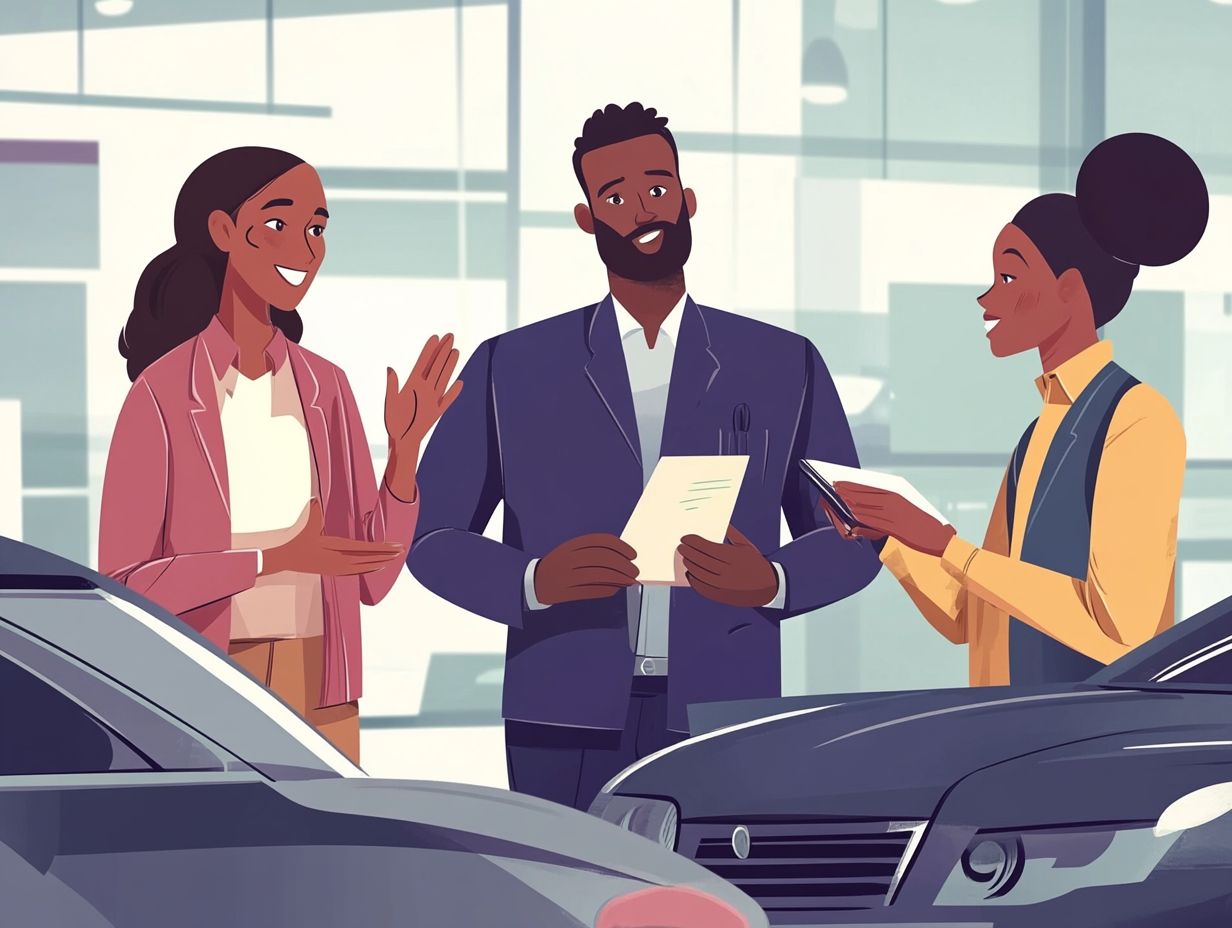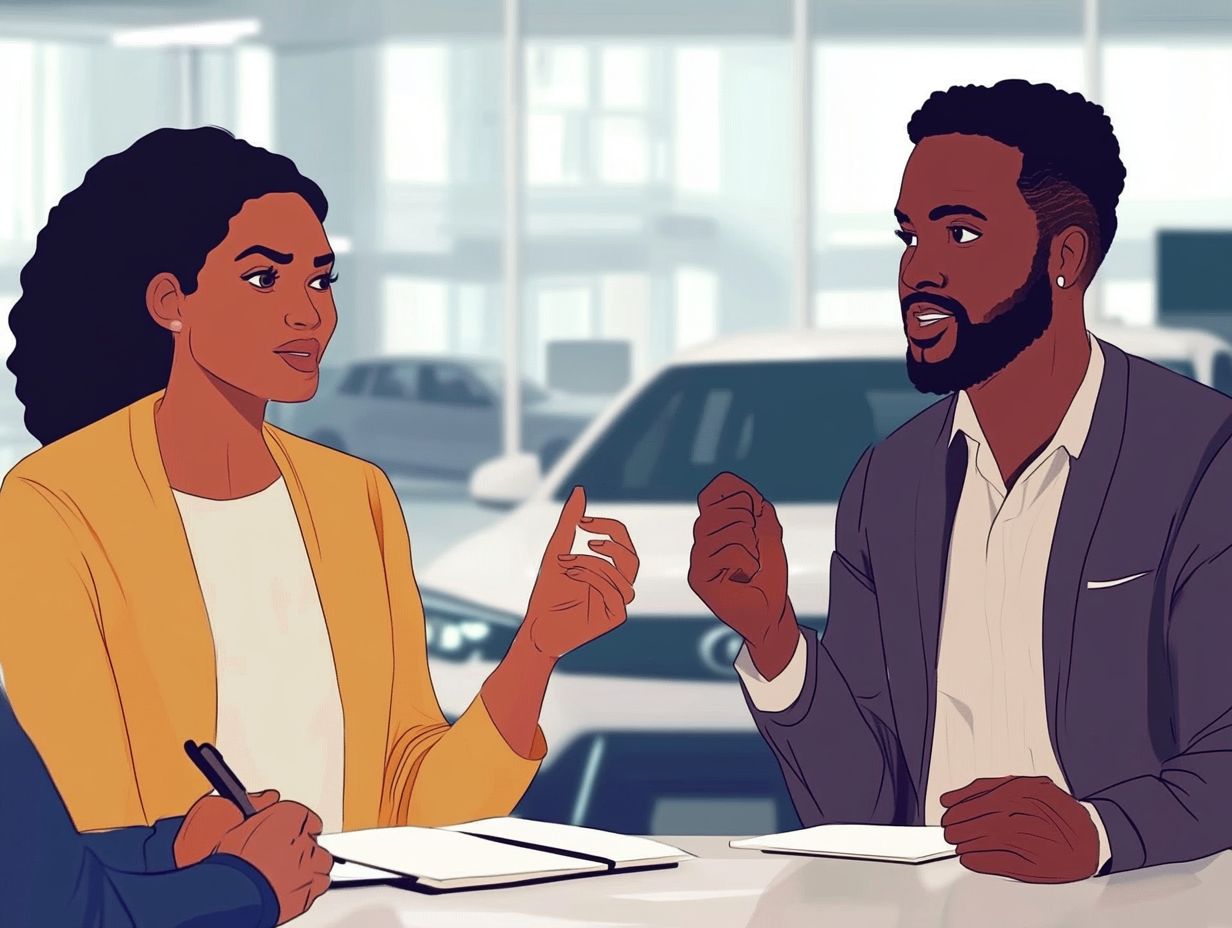The Psychology Behind Car Price Negotiation
Negotiating the price of a car can indeed feel overwhelming, but mastering the art of negotiation transforms that challenge into a valuable opportunity.
This discussion delves into the fundamental principles of negotiation and the psychological factors that influence your decision-making process. From emotional triggers to power dynamics, you ll discover techniques that can provide you with a distinct advantage.
You ll also find practical tips for preparation, effective communication, and gracefully handling rejection. Equip yourself with the insights necessary to navigate negotiations with confidence and secure the best possible deal.
Contents
- Key Takeaways:
- The Art of Negotiation
- Psychological Factors in Car Price Negotiation
- Preparing for Negotiation
- Negotiation Tactics and Tips
- Dealing with Rejection and Walking Away
- Frequently Asked Questions
- What is the psychology behind car price negotiation?
- Why is understanding psychology important in car price negotiation?
- What are some common psychological tactics used in car price negotiation?
- How can knowing about the seller’s psychology help in car price negotiation?
- What are some tips for negotiating car prices based on psychology?
- How can understanding group dynamics impact car price negotiation?
Key Takeaways:

Understand the basics of negotiation before entering into a car price negotiation to effectively communicate and counteroffer.
Be aware of emotional triggers and power dynamics in a negotiation to make informed decisions and not be swayed by persuasive techniques.
Prepare for negotiation by researching and strategizing beforehand to increase the chances of a successful negotiation and avoid disappointment.
The Art of Negotiation
The art of negotiation in car sales involves a sophisticated array of tactics and strategies, all crafted to understand the buying process. Your goal is to ensure that both you, the customer, and the dealership can arrive at a mutually beneficial agreement.
Grasping the nuances of the negotiation process is essential as it encompasses a variety of components. Understanding the role of research in car negotiation can help you navigate high-pressure sales tactics, dealership maneuvers, and the psychology behind customer behavior.
Each interaction throughout the negotiation cycle can profoundly affect your financial choices and sway the overall sales performance.
Understanding the Basics
Understanding the basics of car sales and the negotiation process is crucial for you, whether you’re a buyer or a salesperson. This knowledge lays the groundwork for making informed financial decisions and ensuring successful car transactions.
With this foundational insight, you can skillfully navigate the complex terrain of pricing, trade-ins, and financing options that can significantly impact your buying experience.
Sales training helps professionals like you communicate effectively with clients while building trust and transparency.
Having a solid grasp of financial literacy enables you to assess your budget, evaluate loan offers, and appreciate the long-term consequences of your choices.
By mastering these key concepts and terms, you can customize your approach to match customer preferences, ultimately leading to more satisfying outcomes for everyone involved.
Psychological Factors in Car Price Negotiation
Psychological factors are pivotal in car price negotiation, shaping not only the tactics employed by the salesperson but also the emotional triggers that influence your decision-making process. Understanding what to expect in a car negotiation can further enhance your negotiation skills.
By understanding the nuances of power dynamics and leveraging effective persuasion techniques, you can greatly improve the negotiation outcome for both yourself and the salesperson.
Emotional Triggers and Decision Making

Emotional triggers hold significant sway over consumer behavior and play a pivotal role in your decision-making process when purchasing a car. They influence how you perceive various options and your willingness to negotiate.
The interplay of emotions such as the fear of loss and the desire for status can weave a compelling narrative in your mind as a potential buyer. Consider how many individuals feel a pang of anxiety when contemplating the possibility of missing out on a coveted vehicle; this often leads to impulsive decisions.
This sense of urgency can dramatically distort financial choices, prompting you to stretch your budget in pursuit of the status that accompanies a premium model.
By recognizing these emotional responses, car dealerships can fine-tune their sales strategies, adeptly guiding your choices while addressing the psychological factors that underlie your purchasing journey.
Act now! Understanding these strategies can save you thousands on your next car purchase.
In conclusion, mastering negotiation skills is essential for anyone looking to secure the best deal when buying a car. Equip yourself with these insights and take charge of your negotiating power!
Power Dynamics and Persuasion Techniques
Power dynamics in car sales affect how well you can persuade. Understanding these details helps you develop effective closing strategies.
In these negotiations, you and the seller navigate a complex landscape, with both parties vying for influence while remaining open to each other s needs. Smart buyers often come equipped with knowledge of market trends and vehicle pricing, which strengthens your negotiating position.
On the flip side, sellers may use emotional appeals and urgency tactics, highlighting limited-time offers or the popularity of a vehicle to influence your decisions.
This interplay of strategies creates a sophisticated dance of give and take. A successful outcome often relies on your ability to recognize cues and adapt your approach to achieve mutual goals.
Preparing for Negotiation
Preparing for negotiation in the car-buying process requires deep vehicle research and familiarization with various car models. Establish a budget that aligns with your financial capabilities.
This groundwork enables you to approach negotiations with confidence. Securing pre-approved financing gives you a strategic edge during price discussions, ensuring you re equipped to make informed decisions.
Research and Strategy
Conducting thorough vehicle research and crafting a solid strategy are essential for effective negotiation. This enables you to navigate pricing strategies and potential trade-in discussions confidently.
Utilizing consumer reports provides invaluable insights into vehicle performance, reliability, and owner satisfaction. These reports outline the pros and cons of various models, helping you determine whether the investment fits your needs. By understanding the real market value of your desired vehicle, you empower yourself during negotiations, armed with accurate data to support your offers.
Evaluating the trade-in value of your current vehicle the amount you can receive for your old vehicle when purchasing a new one using online tools enhances your bargaining power. Taking these proactive steps ensures you’re making sound investments while approaching the negotiation table with confidence.
Negotiation Tactics and Tips

Mastering negotiation tactics is crucial for navigating the car-buying experience. By honing your communication skills and crafting strategic counteroffers offers made in response to another offer you can achieve outcomes that benefit both you and the seller.
This approach enhances your bargaining power and helps you sidestep upselling techniques often employed by sales staff, ensuring a smoother transaction.
Effective Communication and Counteroffers
Effective communication is essential in negotiation. Clearly articulating your needs and presenting strategic counteroffers can significantly influence the outcome during price discussions.
Your ability to express what you want affects not just the final price but also your overall satisfaction with the purchase.
When you approach negotiations as a prospective car owner with a clear understanding of your budget, desired features, and market comparisons you position yourself to engage effectively with salespeople.
For example, when you clearly state your expectations for a specific model within a defined price range, you create a framework that guides the salesperson’s efforts.
Imagine confidently countering a dealer’s initial offer with a well-reasoned argument grounded in market value and your needs. This not only helps you secure a better deal but also fosters a positive relationship with the salesperson.
Dealing with Rejection and Walking Away
Facing rejection while buying a car? It can be tough, but it s part of the experience! Handling disappointment gracefully is essential for making informed financial decisions.
Understanding your price sensitivity now can make all the difference in your next negotiation. Embracing this mindset can turn setbacks into valuable lessons, guiding you toward more successful transactions in the future.
Managing Disappointment and Moving On
Managing disappointment after a negotiation setback is crucial. It helps maintain a positive outlook and prepares you for future sales interactions.
Resilience is your best ally. Reflecting on your experiences allows you to pinpoint areas for improvement and embrace valuable lessons.
By analyzing what caused the setback, you can refine your strategies for future engagements. Each obstacle can become a stepping stone for growth.
This flexible thinking enables you to approach discussions with new confidence. Your commitment to learning can lead to more successful negotiations.
Frequently Asked Questions

What is the psychology behind car price negotiation?
This psychology covers the factors that influence how people negotiate car prices, including insights into the psychology behind car reviews, as well as understanding behavior, emotions, and thought processes during negotiations.
Why is understanding psychology important in car price negotiation?
Understanding this psychology helps you grasp your motivations and those of the seller. Familiarizing yourself with dealer tactics in negotiation leads to more informed decisions and effective negotiations.
What are some common psychological tactics used in car price negotiation?
Common tactics include anchoring, scarcity, and reciprocity. Anchoring means starting with a higher price, making a lower offer seem reasonable.
How can knowing about the seller’s psychology help in car price negotiation?
Understanding the seller’s psychology helps tailor your strategy to their motivations. If the seller aims to maximize profit, use tactics that appeal to that desire.
What are some tips for negotiating car prices based on psychology?
Do research on the seller and their motivations. Maintain a confident demeanor and be ready to walk away if needed.
How can understanding group dynamics impact car price negotiation?
Recognizing the influence of others on the seller’s decisions can be helpful. Be aware of any power dynamics and negotiate accordingly.






